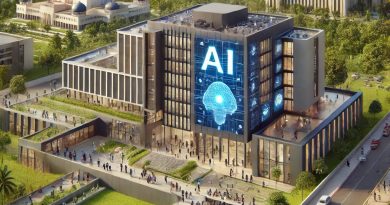How AI is Powering Africa’s Path to Unity and a Smarter Future
From Village Drumbeats to Digital Heartbeats
In a quiet village in Ghana, beneath the golden hue of a rising sun, a teenage girl named Ama stood beneath a Baobab tree, clutching a small tablet in her hands. Her father had spent his life farming under the open skies, guided by the wisdom of ancestors and the rhythm of the seasons. But Ama was different. With her eyes fixed on the tablet screen, she spoke to a virtual assistant in her native Twi. The AI translated her voice, gave her information on soil quality, weather forecasts, and even suggested planting schedules tailored to her region.
In that moment, something powerful happened. The gap between tradition and technology narrowed. The future, once distant and foreign, had arrived quietly and respectfully blending with Africa’s deeply rooted cultures.
This is more than a single story. It’s a glimpse into the transformation sweeping across Africa. Artificial Intelligence is not just a tool of innovation here, it is becoming a unifying force and an architect of a smarter, more connected continent.
A Continent of Complexity, Ready for Change
Africa is a land of rich diversity. With over 1.4 billion people, 54 countries, and more than 2,000 languages, its complexity is both a challenge and an opportunity. For decades, efforts at continental unity and development faced hurdles ranging from infrastructure gaps to educational disparities and fragmented markets.
But today, artificial intelligence is redefining what’s possible. By translating languages in real-time, analyzing satellite imagery for farming, predicting disease outbreaks, optimizing supply chains, and personalizing education at scale, AI is fast becoming the bridge across Africa’s social, economic, and cultural divides.
Read More: Code Wars: The Real Difference Between ML and AI Engineers
How AI Is Fueling Africa’s Unity and Progress
1. Breaking Language Barriers
Language has long been a major hurdle in pan-African communication. AI-driven translation tools, such as Google’s Africa-focused language models or startups like Masakhane, are translating content into Swahili, Yoruba, Zulu, Amharic, and other indigenous languages.
This means a child in Tanzania and a student in Nigeria can access the same educational material. Governments can communicate policies across multilingual populations. Businesses can scale across borders without losing connection to local identity.
2. Transforming Agriculture with AI
Agriculture employs more than 60 percent of Africa’s workforce. Yet many farmers lack access to data-driven tools. AI is changing that.
From Ghana to Kenya, smart agriculture platforms use machine learning to forecast crop diseases, suggest optimal irrigation schedules, and even analyze satellite data to recommend the best planting zones. For instance, Rwanda’s government uses AI to map soil nutrients and guide fertilizer use, leading to more productive harvests.
3. Healthcare: Predicting and Preventing Crises
Africa faces unique health challenges, from malaria and HIV to more recent threats like COVID-19. AI helps health systems move from reactive to proactive.
In Nigeria, AI models have been trained to detect early signs of diseases from X-rays and lab data. South African researchers are using AI to study genetic markers in African populations, improving diagnostics and treatment plans. Additionally, chatbots powered by AI are now delivering mental health support in areas where professional care is limited.

Read More: Brains Behind Billions: How AI Tech is Rewriting the Global Economy
4. Education: Personalized and Scalable
Education is often cited as Africa’s greatest challenge and greatest hope. AI-driven platforms like uLesson in Nigeria and Eneza Education in Kenya are offering personalized learning experiences through low-bandwidth apps. These platforms adapt to a student’s pace, providing quizzes, videos, and instant feedback in both urban and rural areas.
The impact? A more educated population equipped with the skills to build, innovate, and lead.
5. Digital Governance and Civic Engagement
In countries like Senegal and Ghana, AI-powered chatbots and digital assistants are being used to simplify public services. Citizens can ask questions about taxes, healthcare, or voting procedures and get instant, accurate responses. Governments are also using AI to monitor social sentiment, enabling better policy response based on real public concerns.
This fosters transparency, accountability, and a stronger connection between citizens and their leaders.
A New Era of Pan-African Innovation
The African Union’s Agenda 2063, a strategic framework for inclusive growth, emphasizes science, technology, and innovation. AI aligns perfectly with this vision.
Pan-African tech hubs from Kigali’s Innovation City to Lagos’ Yaba Valley are now incubating hundreds of AI startups. These hubs are also fostering cross-border collaborations that blend local knowledge with global expertise.
Take the case of Zipline, a drone delivery company using AI to manage medical supply chains in Rwanda and Ghana. Or InstaDeep, a Tunisian AI startup working with major pharmaceutical firms globally. These examples prove that Africa is not just consuming technology…. it is building it, customizing it, and exporting it.
Read More: Man vs. Machine: Who Really Owns AI-Generated Art?
Frequently Asked Questions (FAQ)
How is AI being used in rural parts of Africa?
AI is reaching rural Africa through mobile apps, solar-powered devices, and community-based tech hubs. Solutions include AI-driven farming advice, voice assistants in local languages, and offline-compatible educational tools.
Is AI accessible to most Africans?
While internet access remains uneven, the rise of mobile connectivity and low-data AI tools is helping bridge the gap. Governments and NGOs are also investing in digital infrastructure to expand reach.
What are the ethical concerns with AI in Africa?
Data privacy, algorithmic bias, and the need for inclusive datasets are major concerns. Local AI communities and researchers are working to ensure that African values and perspectives shape AI development.
Can AI help unite Africa?
Yes. By enabling cross-border communication, improving governance, and supporting shared goals in health, education, and economy, AI is laying the groundwork for a more unified continent.
Conclusion: The Heartbeat of a Smarter Africa
The story of Ama under the Baobab tree is not a fantasy, it’s a preview of Africa’s unfolding reality. Artificial intelligence is not replacing Africa’s heritage. It is amplifying it, modernizing it, and weaving it into a tapestry of shared progress.
This journey is just beginning. With responsible innovation, inclusive policies, and continued investment in local talent, Africa can shape its own AI future, one that is just, smart, and uniquely African.
From the Cape to the Sahara, from urban sprawl to savannah villages, the digital heartbeat of Africa is growing stronger. And as it does, it carries the rhythm of unity, wisdom, and limitless potential.





Pingback: Master the Mix with iZotope Neutron and Discover What Your Tracks Have Been Missing - Newline Tech
Pingback: The Future is Wearable: Tech That Lives on Your Skin - Newline Tech